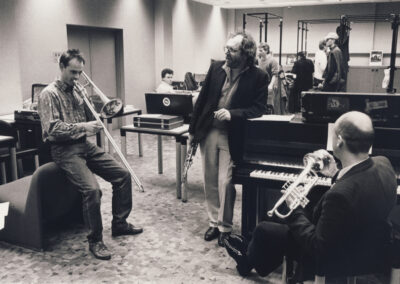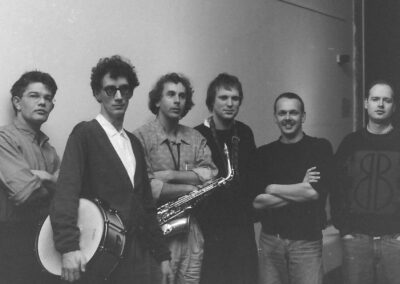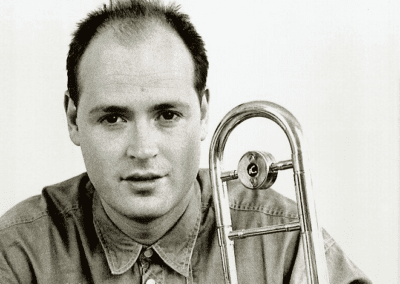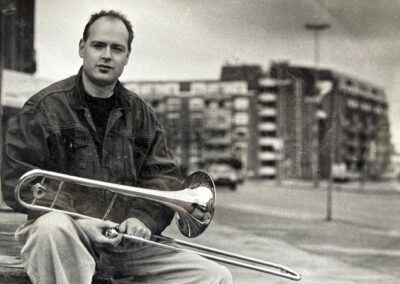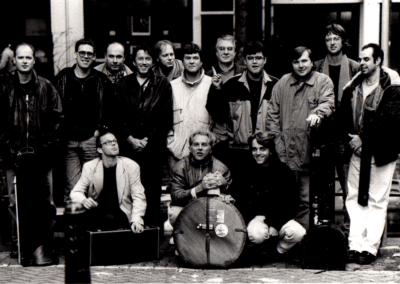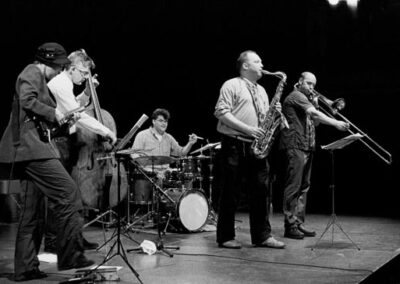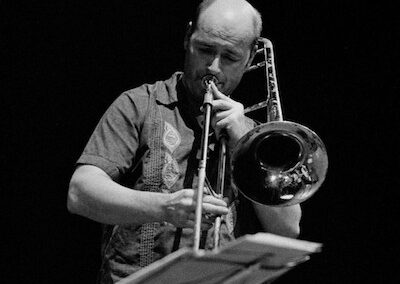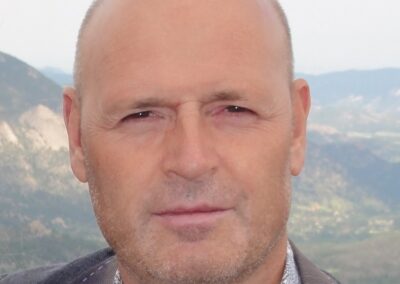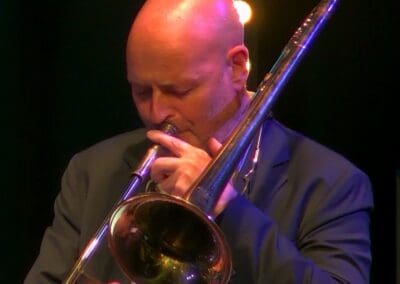Biography
Dutch trombonist Chris Abelen (Tilburg, the Netherlands 29 september 1959) started out on trumpet at 11, switching to the bigger horn at 18. He studied classical trombone with Charles Toet and Henri Aarts, and then jazz and improvised music with Willem van Manen, founding member of and first trombonist with the Willem Breuker Kollektief, the band that first called global attention to Dutch improvised music. In 1984, Abelen took over van Manen’s old chair in the Kollektief from short-timer Garrett List, and would tour and record extensively with that band till 1988.
But Abelen had the urge to lead his own groups. At Willem Breuker’s annual Klap op de Vuurpijl festival in 1992, he led a pan-generational, pan-stylistic international tentet (including Ab Baars and Paul Termos in the reeds, tubist Larry Fishkind and Michael Vatcher on drums), showcasing the players with mini-concertos that demonstrate Abelen’s preoccupations with color, texture and mood, as well as his wry indirect sense of humor. The proof’s on the CD Proost (BVHaast).
But that was a one-shot ensemble. Abelen wanted a band. His first post-WBK working group had been a sextet including tenor saxophonist Tobias Delius and bassist Wilbert de Joode, which debuted on an earlier Klap op de Vuurpijl festival (1989). That evolved into a quartet with drummer Martin van Duynhoven—you can hear that lineup on the live title track to Abelen’s 2011 digital sampler Plint—later replaced by Charles Huffstadt. With the Proost tentet’s Corrie van Binsbergen added on electric guitar, this group became the leader’s signature outfit, the Chris Abelen Quintet, another band of distinct individual voices. The pieces could be highly melodic and/or densely busy, and the spontaneous arrangements were fluid, with no fixed solo routines. The composer/leader functioned as traffic cop on trombone: setting the tempos, calling back the melodies. A few pieces from the Quintet’s 1996 debut Dance of the Penguins return on 1999’s What a Romance, to make plain that fluidity and instant arranging. The 2004 follow-up Space was for another tentet: the Quintet plus Ab Baars on clarinet and the Zapp String Quartet.
Over the years Chris Abelen has also toured and recorded with numerous Dutch jazz and new music ensembles, including Willem van Manen’s Contraband, I Compani, Paradise Regained Orchestra, Eric van der Westen Octet, Dick de Graaf Septet, and J.C. Tans + Rockets. After leaving the Willem Breuker Kollektief, he assisted Breuker in preparing parts for performance and scores for publication. As an outgrowth of that work, Chris now works as a professional engraver, serving publishers such as Boosey & Hawkes (London), Schott, Donemus and Universal; orchestras including the Los Angeles Philharmonic, Royal Concertgebouw Orchestra, Asko/Schönberg Ensemble and Metropole Orchestra; and other composers including Louis Andriessen, Martijn Padding, Willem Jeths, Geert van Keulen, Elmer Schönberger and Mary Finsterer.
In the 2010s, Abelen took his music in a new direction. In 2016 he released his sixth album, A day at the office, for a septet with a new line-up, and a slightly more pop and even funk orientation, despite the instrumentation: trumpeter Angelo Verploegen, Floris van der Vlugt and Tini Thomsen on high and low reeds, and a new guitar/bass/drums rhythm section: Thijs Huijbens, Ulrich Wentzlaff-Eggebert and Yonga Sun. This album is part of a new project in which Abelen collaborates with lyricist/librettist Bastiaan Geleijnse, one of the cartoonists behind the acclaimed Dutch newspaper comic Fokke en Sukke. In 2018 came the sequel Songs on the eve of dismissal, with vocals by Lorena del Mar (Abelen’s first record with a singer). The Chris Abelen 7’s Live at the BIM (2020) is drawn from a June 2019 concert at Amsterdam’s Bimhuis, featuring songs from the latter album; performances from that concert are posted on YouTube.
Other new albums were in the pipeline when the global pandemic hit in 2020: The joy of an empty trash can for a new quintet and a final version of the project Bye Bye Bloomingdale, previewed on a trombone-and-samples singles released in 2018.
Discography
As leader
- Dance of the penguins (CAMP 001, first published by BVHAAST) – (1996)
- What a romance (CAMP 002, first published by BVHAAST) – (1999)
- PROOST (CAMP 003, first published by BVHAAST) – (2002)
- Space (CAMP 004, first published by BVHAAST) – (2004)
- Plint (CAMP 005) – (2011)
- A day at the office (CAMP 006) – (2016)
- Bye bye Bloomingdale (CAMP 007) – (2017)
- Songs on the eve of dismissal (CAMP 008) – (2018)
- Live at the BIM (CAMP 009) – (2019)
- The joy of an empty trash can (CAMP 010) – (release in 2024)
- The audience is growing (CAMP 011) – (2020)
- BANK (CAMP 012) – (release in 2024)
- Natural Tattoo (CAMP 013) – (release in 2025)
Interviews
All About Jazz Q & A
Instrument(s):
Trombone, piano.
Teachers and/or influences?
I had a lot of teachers from my childhood but I would like to mention Charles Toet, a baroque trombonist and my 1st trombone teacher at the Academy of Music (I started with classical trombone), and Willem van Manen, with whom I studied jazz and improvisation in Amsterdam.
About the influences, on trombone Dick Shearer, when talking about sound and J.J. Johnson(clarity). I hardly listen to other trombone players but Miles Davis, John Coltrane, Duke Ellington, Stan Kenton and Keith Jarrett are my main influences in jazz.
Your sound and approach to music
As mentioned before, Dick Shearer for the sound.
And the approach to music, I learned from Willem Breuker when I played in his band to listen to other music than jazz. So I started listening to Mozart, and later on expanded this to all the great classical composers. But my favorites are still Mozart for his Da Ponte operas, Beethoven and Schubert for their string quartets and piano sonatas, and Stravinsky for The Rake’s Progress.
Your teaching approach
I don’t teach, but when someone asks me advice on how to improvise I tell them to take long breaks between their phrases. This gives more room to the music, otherwise you will be listening to a kind of 8th note exercise instead of a solo with a story or idea.
Road story: Your best or worst experience
Once I had a concert with my quintet and during this concert there was a lady who was talking the entire time. Very disturbing, so I asked her after the concert why she didn’t stop while we were playing. She said ‘O, I supposed this was allowed because it is a jazz concert.’ I asked her if she didn’t notice she was the only one. But she had no idea what I was talking about, so I gave her my CD of the band to listen at home so she could hear what she missed.
Your favorite recording in your discography and why?
Space, with my quintet, Ab Baars on clarinet and the Zapp String Quartet.
The first jazz album I bought was:
I can’t remember, must be something with a big band, I think from Stan Kenton, Live at Redlands University. The Kenton albums were hard to get in those days, but one day I was shopping in another town and in a department store like Harrods they had to my surprise a few Creative World Kenton albums. But I didn’t have any money with me, so I took the train home, and hoped they would still be there when I returned. Fortunately for me most people didn’t know Kenton in the Netherlands so I went home as the proud owner of some very rare Stan Kenton albums (among them the Graettinger’s City of Glass and Adventures in Standards with the mellophones).
How would you describe the state of jazz today?
A fine state, but it could use some more listeners and performers.
What are some of the essential requirements to keep jazz alive and growing?
Education, the risk nowadays is with everybody listening within their own bubble, young children don’t hear any (jazz) music outside it anymore. The same goes for classical music.
What is in the near future?
At this moment I am working on a new project, Songs on the eve of dismissal, with a friend of mine, Bastiaan Geleijnse who wrote the lyrics. We first wanted to write an opera, but this project it more manageable to start with. It’s about working in an office, with the fear of being dismissed, instead of the usual love song themes.
For this project I released two albums, the Songs album and A day at the office, the instrumental part of the project (Lorena del Mar sings the Songs titles). We are organising a tour for this project in western Europe.
What is your greatest fear when you perform?
It is not really a fear but more an inconvenience, dry lips which limits my range. So don’t eat a pasta with Parmesan cheese before a concert.
What song would you like played at your funeral?
“Walk Softly” by theStan Kenton Orchestra, from the album Live at the London Hilton Hotel. And my relatives should play “Shout” from The Trammps and “California Soul” from Marlena Shaw during the afterparty.
What is your favorite song to whistle or sing in the shower?
I usually whistle the song I last heard or played.
If I weren’t a jazz musician, I would be a:
1st violin player in a string quartet.
Jazznu.com interview (16 may 2018) about the Songs on the eve of dismissal project with Bastiaan Geleijnse – Rinus van der Heijden – translation: Wouter van den Bro
Chris Abelen. Who? Chris Abelen … Trombonist. Oh … Gosh, never heard of him. Which is possible. Yet Chris Abelen is an important player in the Dutch jazz environment. If only because he was the first trombone player of the Willem Breuker Kollektief for four years. Or because he has already released six albums under his own name. Two were recently released, each other’s successors. A sort of opera which deals with how people spend their lives in an office. And many have to say goodbye to it.
Chris Abelen is the creator of a project which has captured the life in an office in music.
A Day At The Office and Songs On The Eve of Dismissal are the titles. The first CD was released in 2016, the second one this year. Yet they belong together like a foot and a shoe. “It is actually one record,” says Chris Abelen, creator of the project and composer and leader of the ensemble which has recorded the music on the two discs. “It started with two vocal songs, but because the lyrics took a while, I started writing a number of instrumental songs. Which led to the first CD, on the one hand as a kind of warm-up for what would come next in lyrics, but also because we wanted to use the pieces as a change of the vocal pieces. ”
Two albums about office life. How do you get your feelings and experiences trapped in music in an office? “No idea,” the composer laughs. Yet the two plates have curiosity generating content. And depth. In fact, the loss of identity is surrounded by music, the arbitrariness to which the working person must submit. Plus the fear that you as a toy of the capital can be pushed into the rubbish bin.
FOKKE & SUKKE
First something about the history. A few years ago Chris Abelen came in contact with Bastiaan Geleijnse, journalist, columnist, comedian and co-creator of the Fokke & Sukke comic. Musician and writer became friends. When they were sitting together again, they came up with the idea of creating an opera. “Just as a joke,” Chris Abelen said. “Bastiaan had no experience with that, neither did I. We afterwards always said that we would start, but nothing came of it. Until at some point Bastiaan showed me two songs: Nobody Told Me and Honey Text Me Back. I started making music for it. And as said, the instrumental CD first came into existence, awaiting the following lyrics. ”
A special ‘handle’ characterizes the Martin TR 4501-trombone by Chris Abelen.
When composing the band that had to play the music, Chris Abelen – born in Tilburg and also attended the Brabant Conservatory there – envisaged the occupation of Vaalbleek (band from Tilburg from the seventies, led by Niko Langenhuijsen, rvdh): four wind instruments with different instruments, making many variations possible, such as four-part chords, counterpoint and soli. For the high he chose the trumpet of Angelo Verploegen and the soprano and alto saxophone of Floris van der Vlugt, the low was filled in by his own trombone and the baritone saxophone and bass clarinet of Tini Thomsen. Accompanied by the guitar of the very young Thijs Huijbens and double bass and percussion by Ulrich Wentzlaff-Eggebert and Yonga Sun respectively. “I chose the guitar because of the contemporary sound. A piano could have been possible, but it is a bit more classic. The advantage of four horns is that you have enough parties and you can also fully improvise. ”
The (first) CD A Day At The Office contains thirteen pieces, the second Songs On The Eve Of Dismissal nine. The first disc is completely instrumental, the second contains eight vocal pieces. “prayer to the shareholder initially was not one. I find it a challenge to put a nice melody under a piece which is not suitable for singing, “says Chris Abelen. The division 13-9 was created by chance.
BACKBONE
The aforementioned pieces Nobody Told Me and Honey Text Me Back are the backbone of the project by composer Abelen and writer Geleijnse. “With these two pieces, Bastiaan and I knew which way it would go. Another one preceded the occupation which I finally chose. With Corrie van Binsbergen on guitar, Hein Offermans on double bass, Felicity Provan with vocals and trumpet, Tini Thomsen on bass clarinet and baritone saxophone, Bart van de Putten on soprano and alto saxophone and Yonga Sun on percussion. This combination turned out not to work, because the music went more into the pop and funk side. I wanted contrasts, otherwise I might as well have been working with my own quintet. I decided to go on with Tini and Yonga, I found Floris on YouTube and I gathered the rest in other ways. ”
Melody is important for the composer Chris Abelen. “I always start with the melody. I usually write it when I play the trombone. Some melodies, such as Huub on A Day At The Office I write down immediately, on others I often spend days. In doing so, I use the starting point: if I listen to my music and she bores me, then it simply goes away. Regardless of the amount of work involved. Music should not annoy me, at least I compare it to the string quartets of Haydn and Schubert, you can continue to listen to it. But that is where the comparison ends, because of course what I write is nothing compared to what the old masters wrote. ”Is melody the only pillar on which the music of Chris Abelen comes about? “No no. The bass line comes second. And then follow the wind instruments and the other instruments of the rhythm section as a dressing. That is usually conceived behind the piano, but nowadays it is also becoming easier behind a computer. “
Chris Abelen:” When I listen to the music which I have written and she bores me, she will just leave. ”
A Day At The Office and Songs On The Eve Of Dismissal were recorded by Chris Abelen himself, at home and in the studio. “I have had bad experiences with sound technicians. The recordings are usually fine, but mixing is often a disaster because the technicians are supposed to do it in one day – otherwise it would also become unaffordable. But also because there are a number of people of whom you wonder what they think is more important, the music or all those buttons. That is why I have mixed and produced everything myself. I also had in mind from the start that I wanted to make it a ‘minus one’ project as well. What is special about this is that you can now play along with the original studio recordings, both the party or your own solo. ”
SINGING
Songs On The Eve Of Dismissal has become a CD on which singing takes a central place. The vocals are for Lorena del Mar’s account. “I was looking for a singer and ended up with Lorena in a detour,” explains Chris Abelen. The singer (1983) was born in Spain, studied at the conservatories of Madrid and The Hague and currently lives in Brussels. “I received a number of texts from Bastiaan which I put to music, but also the other way around, which meant that he had to come up with an existing melody, what was also a nice challenge. In addition to Lorena’s voice, I also saw the wind players and guitarist as voices. So you get the idea of, for example, office people at the coffee machine. I never knew for a moment how exactly I would approach it. I didn’t want to think too long about writing music for the lyrics. ”
“ I usually read through the text once or twice and then the notes roll out. Remembering Willem B refers to the time when I worked with Willem Breuker, I sat next to him as he composed and recorded the notes. “And then laughed:” There was little rest in those parties, I can assure you. With this project it is the exact opposite. Willem would never have written like that, with only a soprano sax and bass clarinet at the bottom. He would have closed it all down. ”
A fragment of the trombone of Chris Abelen, a Martin TR 4501 (Herbie Green).
The music on the two CDs is not limited by certain styles. “I always try to stay within one style, but to push its limits. I don’t necessarily focus on a certain style, but things have to fit together. When composing I always have a common thread in my head. After three or four pieces I think: now things can get a bit quieter. I also did that with my own quintet, that contrast is very nice and clear. It is also nice to play when nothing is fixed. But for the project we are talking about, I would rather have arrangements in connection with the larger occupation and because it had to become a more compact funk/pop album. ”
WILLEM BREUKER
Chris Abelen. Chris who? We were already talking about it. That is not surprising, because although the trombone player played in the Willem Breuker Kollektief and then with the Contraband, I Compani, Paradise Regained Orchestra, Eric van der Westen Octet, Dick de Graaf Septet and various own groups, he went into hiding from 2004 in anonymity. “My last CD dates from that year, after that I hardly played any more. My trombone shows a spot that he got by resting on his stand for a long time, “laughs Chris Abelen. “As a half job, I mainly do copyist work. I also looked after the children because my wife often stayed abroad because of her work. Another factor was that I am not the easiest person to be in a band with. It usually goes well for a while, but then I start to hear things that I think ‘could be different, or even better’. Then there is actually only one option left, starting your own band(s) and writing your own music. You can no longer complain about anything and you just have to realize it. And you save your colleagues a lot of grumpiness, you could almost say a kind of act of charity – just kidding of course! In the meantime I practice every day and I want to start new projects again. Including a quintet, albeit with a new line-up. ”
Chris Abelens work as a copyist actually started with Willem Breuker, where he – as he already noted – recorded his composed notes. “When I left the Collective in 1988 after four years, I did nothing for a while. At a certain moment Willem called. He had bought an Atari computer and asked, “Can you install it?” That’s how I rolled into it. Producer Piet Hein van de Poel came by once and said: “If you can work with computers, I can use you as well.” That was in the early nineties. Until the death of Willem (in 2010, rvdh) I instrumented parts of the Kollektief and put them in the computer. I knew exactly what Willem wanted. ”
Since 1990, Chris Abelen has been the permanent copyist of the composers Louis Andriessen, Martijn Padding and Willem Jeths. “I have about seven or eight people I always work for. Sometimes I do extra work for Donemus (institute for documentation of contemporary, Dutch music, rvdh). It is an ideal job if you have to raise children and your wife works full time. The only thing is the deadline, but it doesn’t matter how you make it. ”
Chris Abelen:“ It’s also nice to play when nothing is fixed. ”
THEATER PERFORMANCE
Chris Abelen and Bastiaan Geleijnse are considering taking the 2019-2020 season go on tour with a theater performance, Songs On The Eve Of Dismissal, based on the life-at-office project. “The joke is that it is obvious that people will be fired. But the performance which we have in mind is also about the assessment of the musicians. The audience sees whether the musicians are performing well. Gradually people are thrown out of the band and sampled music replaces it. ”
And are the plans for an opera still on the table? “We would like that,” says Chris Abelen. “That’s why I say why not? But you do not easily enter the opera world. Who knows if we can bring this project to a successful conclusion? ”Does this mean that there are also plans for similar projects? “No, but I would like to continue with a band with singers. Or a choir. I want to work with Bastiaan again, but I don’t know how yet. Perhaps we can do something with what all preceded the current project, such as Better Call Saul and Breaking Bad. But I am now making this up on the spot.”
Setup
Trombone:
King 4B, Vincent Bach 42 (classic) & 36 (jazz)
Yamaha student model (Willem Breuker Kollektief)
Courtois (all bands till 2004, then a long break)
Martin TR 4501 (2008 – )
Mouthpiece:
Giardinelli 5D & 4D
Best Brass S 8D (2019-2020) – The audience is growing
Doug Elliot – MT98 rim – C cup – D2 shank (2021 – )
Recording gear:
Applied Microphone Technology
AMT P808OB “Off the Bell” Trombone Microphone System with Inline Preamp
Neumann TLM 102
Focusrite Scarlett – Logic Pro X

